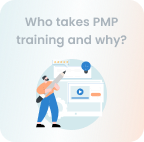







 10 Sep 2024
10 Sep 2024



Imagine a scenario when you’re given the task of managing a critical project for a tech company. Herein, should you follow a detailed, step-by-step plan or adapt quickly to changes and feedback? This is the essence of choosing between PMP vs Scrum. Have you ever wondered which certification aligns better with your career aspirations? Or how each can impact your professional growth?
In this blog, we’ll delve into the key differences between PMP vs Scrum, helping you make an informed decision. Let’s explore the unique benefits and opportunities each certification offers so you can confidently navigate your career path.
Table of Contents
1) What is PMP?
2) What is Scrum?
3) Key Differences Between PMP and Scrum
a) Prerequisites
b) Cost of Certification
c) Duration of the Certification
d)Industry Demand
e) Desired Work Location
f) Approach to Methodology
g) Career Role
h) Expected Salary
4) Conclusion
The Project Management Professional (PMP) is a worldwide-recognized certification; and is offered via the Project Management Institute (PMI). It emphasizes conventional undertaking management methodologies and covers numerous expertise regions, together with scope, time, and cost management. Achieving this certification demonstrates a challenging manager’s competence and dedication to the profession.
It also complements career possibilities by validating one’s competencies and understanding in dealing with tasks successfully. Additionally, PMP-licensed professionals are frequently desired by employers for his or her verified ability to steer and direct projects efficiently.

Scrum is an agile framework designed for growing, delivering, and retaining complex merchandise. The most broadly identified Scrum certification is the Certified Scrum Master (CSM), offered by the Scrum Alliance. Additionally, there are other certifications available, which includes the Certified Scrum Product Owner (CSPO). These certifications validate an expert’s understanding in Scrum practices and concepts, making them exceptionally precious in agile undertaking environments.
By acquiring those certifications, individuals can decorate their professional prospects and display their capacity to successfully control and lead Scrum teams. Moreover, certified Scrum professionals are often sought-after by groups inclined to put in force or enhance their agile procedures.
The PMP and Scrum Certifications each offer unique advantages and cater to different professional needs and industry demands. Understanding the key differences between PMP and Scrum will aid you in understanding which path best suits your career goals and the specific requirements of your job role. Here are the main distinctions between these two certifications:

To qualify for PMP certification, applicants need a high college diploma with 7,500 hours of enterprise management as well as 35 hours of Project Management coaching. Optionally, a 12-month degree with 4500 hours of Project Management experience and 35 hours of assignment control guidance might also work. In assessment, Scrum Certifications consisting of Certified Scrum Master (CSM) have much less stringent requirements. No education or experience is required, despite the fact that attending a two-day training direction and passing an examination is needed.
The price of acquiring the PMP Certification can be high. PMI participants pay round $405 for the examination, at the same time as non-members pay approximately $555. Additionally, there can be fees associated with education publications and study materials. On the opposite hand, the fee for Scrum certifications like CSM is normally less. The CSM direction and examination generally cost between $1,000 and $1,500, which includes the value of the training and the examination charge.
The PMP certification remains valid for a maximum of 3 years. To hold the certification, specialists need to earn 60 Professional Development Units (PDUs) within this period. Conversely, the CSM certification is valid for 2 years. To renew the certification, professionals must pay a renewal charge and earn Scrum Education Units (SEUs).
The PMP certification is highly regarded across various industries, including construction, healthcare, finance, and IT. It is mostly a requirement for senior Project Management roles. In contrast, Scrum certifications are particularly in demand in industries that adopt agile methodologies, such as software development, IT, and product management. The growing popularity of agile practices has increased the demand for Scrum-certified professionals.
The PMP certification is broadly valued and recognized, making it useful for professionals seeking possibilities in numerous nations and industries. Whereas, Scrum certifications also are recognized worldwide, however they may be specially treasured in areas and industries wherein agile practices are popular, along with North America, Europe, and era hubs.
The PMP certification focuses on traditional Project Management methodologies, emphasizing processes, tools, and techniques to manage projects effectively. On the other hand, Scrum certifications emphasize agile methodologies, promoting iterative development, collaboration, and flexibility to adapt to changing requirements.
PMP-certified professionals often take on roles such as project managers, program managers, and portfolio managers, overseeing projects from initiation to completion. Conversely, Scrum-certified professionals typically work as Scrum Masters, product owners, or agile coaches, facilitating Scrum practices and ensuring team adherence to agile principles.
PMP-certified professionals generally command higher salaries due to the rigorous requirements and the certification’s recognition. Salaries can vary widely based on industry, location, and experience. In contrast, Scrum-certified professionals also earn competitive salaries, particularly in agile-centric industries. Compensation can vary based on the specific Scrum role, industry, and experience level.
Deciding on PMP vs Scrum depends on your career desires and the enterprise in which you aim to thrive. If you are searching for a dependent, conventional technique to project control, PMP is probably your satisfactory wager. Conversely, if you prefer a bendy, agile methodology, Scrum will be the correct desire. Ultimately, both certifications provide valuable abilities that could drastically enhance your expert adventure.






© Copyright 2017. All rights reserved. Contact: PMP® TRAINING ACADEMY.
